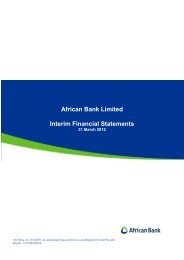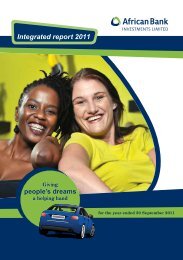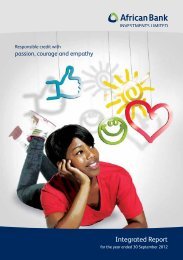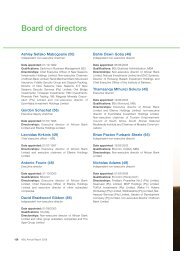Download - African Bank
Download - African Bank
Download - African Bank
Create successful ePaper yourself
Turn your PDF publications into a flip-book with our unique Google optimized e-Paper software.
agreements, to ensure that the material<br />
is understandable and written in plain<br />
language and the terms and conditions<br />
are reasonable. Pamphlets summarise<br />
the client’s rights and obligations as a<br />
client of <strong>African</strong> <strong>Bank</strong>, and material<br />
received by the MFRC and Office of the<br />
<strong>Bank</strong>ing Adjudicator on consumerrelated<br />
issues are regularly distributed at<br />
branch outlets. <strong>African</strong> <strong>Bank</strong> runs<br />
campaigns for staff on customer rights,<br />
including campaigns on the MFRC rules,<br />
the code of banking practice and the<br />
seven internationally-recognised rights of<br />
consumers. The group supports client<br />
rights as an associate member of the<br />
South <strong>African</strong> Consumer Union, and each<br />
year, it celebrates International<br />
Consumer Rights Day on 15 March –<br />
both with staff through internal activities<br />
as well as with clients through the branch<br />
outlets. In 2002, <strong>African</strong> <strong>Bank</strong> received<br />
the MFRC award for consumer<br />
education.<br />
During the past financial year, <strong>African</strong><br />
<strong>Bank</strong> Retail initiated a major campaign to<br />
improve its complaints handling service<br />
to clients. Under the banner “Zama<br />
Icebo” (Just Do It!), more efficient<br />
processes were put in place to provide<br />
an efficient and speedy resolution of<br />
complaints and keep clients informed.<br />
The philosophy for resolving complaints<br />
is based on respect for client rights,<br />
balancing the interests between the<br />
group and its clients, and ensuring<br />
that it acts fairly in all its dealings<br />
with clients.<br />
The group ensures that clients know<br />
where to complain by providing contact<br />
details on each loan agreement, a copy<br />
of which is given to the client. These<br />
details include the <strong>African</strong> <strong>Bank</strong><br />
telephone and facsimile details, as well<br />
as those of its regulator (the MFRC) and<br />
the Office of the <strong>Bank</strong>ing Adjudicator.<br />
Posters detailing its internal complaints<br />
procedures and those of its regulators<br />
are displayed in all branches.<br />
During the review period, <strong>African</strong> <strong>Bank</strong><br />
received an average of 9 095 queries per<br />
month nationally, ranging from allocation<br />
of payment requests, changing bank<br />
details, querying the progress of a loan<br />
application, or challenging a loan<br />
application rejection, to more<br />
complaints-oriented matters such as a<br />
request for a refund or a challenge of the<br />
terms of a loan. Most of these queries<br />
emanate directly from clients and with<br />
the Zama Icebo campaign, the focus is<br />
on a speedy (currently 48-hour) response.<br />
Going forward, <strong>African</strong> <strong>Bank</strong> will focus on<br />
systems enhancement which will ensure<br />
a speedier response time, and lead to a<br />
decline in the number of<br />
queries/complaints received.<br />
Complaints received during the past year<br />
from the MFRC and banking adjudicator<br />
average 7 and 17 per month respectively<br />
(totalling 87 and 209), and <strong>African</strong> <strong>Bank</strong><br />
has received commendations from both<br />
institutions on its service levels.<br />
Client care<br />
At client-interfacing levels, a training<br />
programme called Tholulwazi (Be<br />
Informed) was introduced. The objective<br />
was to highlight the desired excellent<br />
client focus and ensure it becomes<br />
entrenched as part of the <strong>African</strong> <strong>Bank</strong><br />
experience and culture. The training is<br />
ongoing and has been successful.<br />
Government and<br />
parliament<br />
ABIL conducts business in the low-income<br />
segment of the market in South Africa.<br />
This represents, by and large, the poorer<br />
and thus more vulnerable people within<br />
the socio-economic fabric of our society.<br />
Given the history of micro-lending in<br />
South Africa and the historical stigma<br />
that has been associated with the<br />
industry, ie that lending practices in the<br />
industry tend to exploit poor<br />
communities by charging exorbitant<br />
interest rates, government has a<br />
particular concern about the industry.<br />
This makes it imperative that relations<br />
with the relevant stakeholders are<br />
proactively pursued to ensure a<br />
separation of incorrect perception from<br />
the actual reality on the ground.<br />
The group has taken the view that to<br />
operate sustainably in the market, there<br />
needs to be a closer working relationship<br />
between ABIL, government (and relevant<br />
agencies) and parliament. Much effort<br />
has therefore gone into cultivating<br />
existing relationships and starting new<br />
ones where necessary. Relations have<br />
been strengthened over the past year<br />
and the group will continue to build on<br />
these in future. As example, discussions<br />
have been held with the National<br />
Department of Housing to explore its<br />
vision of dealing with the legacy of lack<br />
of credit for housing to low-income<br />
groups in South Africa. Meetings were<br />
also held with the Department of Trade<br />
and Industry and Department of<br />
Transport, amongst others.<br />
ABIL is also an active participant in the<br />
regulatory review process initiated by<br />
government and discussed in the letter<br />
to stakeholders.<br />
Suppliers<br />
<strong>African</strong> <strong>Bank</strong>’s non-discretionary<br />
expenditure amounts to 85% of<br />
operating costs. This covers employment<br />
costs and commissions (50,5%), property<br />
costs (7%) and other costs such as audit<br />
fees, depreciation (6%) and bank<br />
charges.<br />
Discretionary expenditure constitutes<br />
15% of the operating budget, of which<br />
50% is spent with empowerment<br />
companies.<br />
Over the last year, the company has<br />
actively continued its commitment to<br />
support empowerment companies. The<br />
process was informal in the past but has<br />
now been formalised, with systems in<br />
place to monitor and evaluate progress.<br />
Research into the bank’s procurement<br />
policies and procedures enabled it to<br />
assess the status quo of empowerment<br />
contracts throughout the company. Part<br />
of the assessment entailed suppliers<br />
submitting their employer and employee<br />
profiles, employment equity figures, and<br />
employment equity strategies. Suppliers’<br />
empowerment management figures<br />
range from 20% to 62% and<br />
empowerment staff complements range<br />
from 37% to 81%.<br />
More alignment will take place as all<br />
divisions are divisionalised into <strong>African</strong><br />
<strong>Bank</strong>. The Credit Indemnity operation is<br />
currently reviewing its practices and<br />
procedures to bring its procurement<br />
policy in line with the group. One or two<br />
subsidiaries, such as Commercial Vehicle<br />
Finance, have minimal discretionary<br />
expenditure and suppliers are used on<br />
an ad hoc basis.<br />
77<br />
<strong>African</strong> <strong>Bank</strong> Investments Limited







